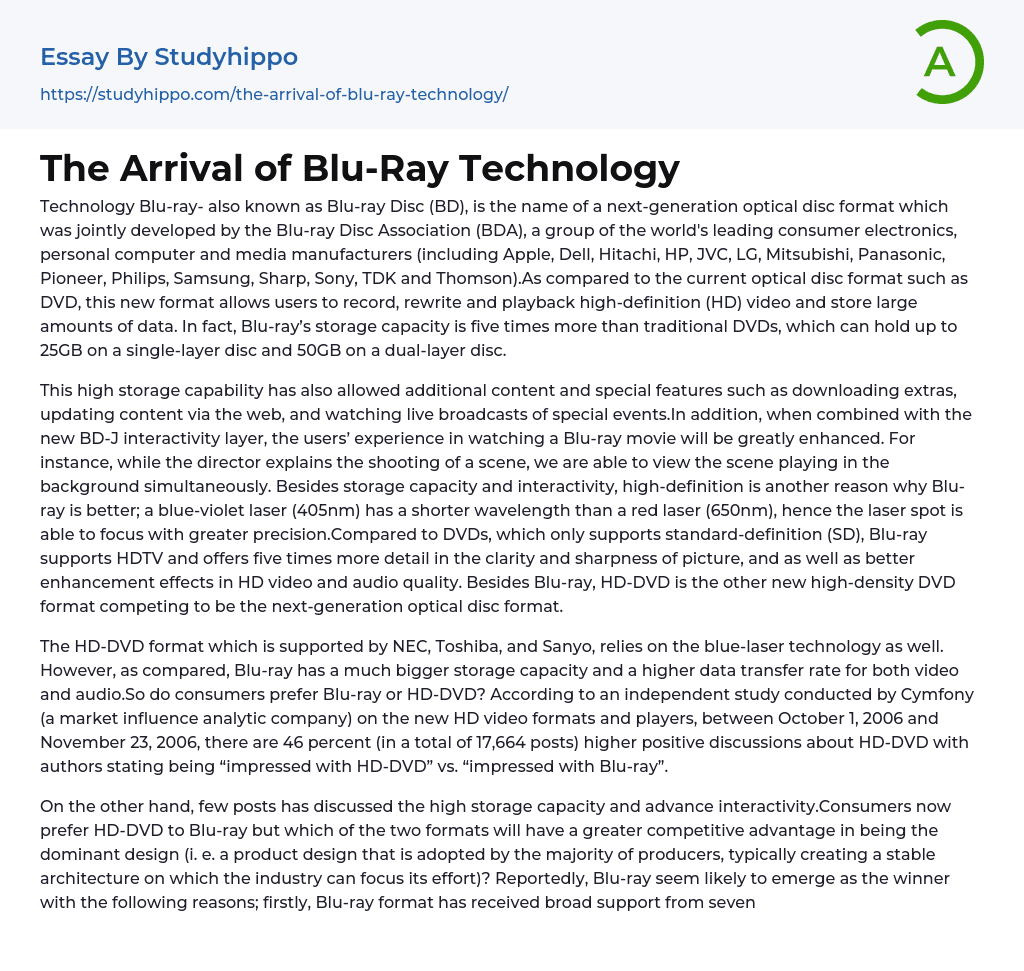Blu-ray, which is also referred to as Blu-ray Disc (BD), is an advanced optical disc format that was developed by the Blu-ray Disc Association (BDA). The BDA comprises leading manufacturers in various industries such as consumer electronics, personal computers, and media. These manufacturers include Apple, Dell, Hitachi, HP, JVC, LG, Mitsubishi, Panasonic, Pioneer,
Philips Samsung Sharp Sony TDK and Thomson. Unlike DVDs,
Blu-ray allows users to both record and rewrite high-definition (HD) video while having the ability to store large amounts of data.
Due to its storage capacity being five times greater than traditional DVDs,
Blu-ray discs can hold up to 25GB on a single-layer disc and 50GB on a dual-layer disc.
This expanded storage capability opens doors for additional content and special features like downloading extras,
updating content through the web,
and live broadcasts of special events.
Furthermore,
when combined with the new BD-J interactivit
y layer,
the viewers' experience of watching a Blu-ray movie is significantly enhanced.
While we watch it in the background, the director describes the scene being shot. Blu-ray surpasses DVDs due to its higher storage capacity, interactivity, and high-definition capabilities. Utilizing a blue-violet laser with a shorter wavelength, Blu-ray achieves more precise focusing of the laser spot compared to DVDs. In contrast, Blu-ray enables HDTV support and offers five times greater clarity and sharpness in picture detail than DVDs. Additionally, it provides superior enhancement effects in HD video and audio quality.
HD-DVD is another high-density DVD format that competes directly with Blu-ray. Both formats employ blue-laser technology; however, Blu-ray boasts larger storage capacity and faster data transfer rate for video and audio content. A study conducted by Cymfony between October 1, 2006 to November 23, 2006 shows that authors who were "impressed
with HD-DVD" engaged in more positive discussions about HD-DVD compared to Blu-ray.
The ongoing debate among consumers about preferring HD-DVD or Blu-ray has left the ultimate winner uncertain. However, several factors indicate that Blu-ray is likely to prevail. One major reason is the extensive support from seven out of eight major movie studios - Warner, Paramount, Fox, Disney, Sony, MGM, and Lionsgate - for Blu-ray. In contrast, only three major movie studios - Warner, Paramount, and Universal - back HD-DVD. Therefore, if these studios exclusively endorse one format or the other, consumers would be unable to access their favorite movies in different formats.
Furthermore, Blu-ray enjoys significant support from major players in the global consumer electronics, personal computer, and media manufacturing industries. Companies like Apple, Dell, Hewlett-Packard, Sony, Samsung, Panasonic, among others are backing Blu-ray. In contrast to this widespread support for Blu-ray, HD-DVD only receives backing from NEC, Toshiba and Sanyo. This discrepancy has led to conflicting results emerging.
Despite the success of Sony's PlayStation 3 (PS3) console with its integrated Blu-ray optical drive - which analyst Ross Rubin refers to as a successful "Trojan horse for Blu-ray" - research conducted by Cymfony challenges this claim. The study findings reveal that gamers were dissatisfied with the inclusion of a Blu-ray player in the PS3 due to increased costs without an alternative choice. Currently in the market earlier than Blu-ray, HD-DVD holds an advantage over it in terms of pricing and film availability.
Blu-ray technology is currently more expensive due to limited economies of scale. However, the Blu-ray Disc Association predicts that as production volume increases and costs decrease, Blu-ray will eventually become comparable to DVDs in terms of
cost. Additionally, a wide range of complementary products such as players, recorders, drives, writers, and media will attract users and increase the installed base.
According to Utterback and Abernathy's technology evolution model, Blu-ray is currently in the later stage of its fluid phase and progressing towards the next phase known as the specific phase where architecture stabilizes. On the other hand, HD-DVD has an advantage as it was introduced first in the market for next generation optical disc formats and leads due to lower costs.
Therefore, there will be fierce competition between these formats in the future with consumers having time before deciding which format they prefer. The ultimate winner has not yet emerged.
- Computer File essays
- Desktop Computer essays
- Servers essays
- Photo Equipment essays
- Video Game Console essays
- Camera essays
- Cell Phones essays
- Computer essays
- Ipod essays
- Smartphone essays
- Cloud Computing essays
- Computer Science essays
- Consumer Electronics essays
- Data Analysis essays
- Electronics essays
- engineering essays
- Enterprise Technology essays
- Hardware essays
- Impact of Technology essays
- Information Age essays
- Information Technology essays
- Modern Technology essays
- Operating Systems essays
- people search essays
- Robot essays
- Adidas essays
- Amazon essays
- Apple essays
- Bmw essays
- British Airways essays
- Burger King essays
- Coca-Cola essays
- Company essays
- Costco essays
- Dell essays
- Ebay essays
- Enron essays
- Facebook essays
- Ford Motor Company essays
- Gap essays
- General Motors essays
- Google essays
- Honda essays
- Ibm essays
- Ikea essays
- Intel essays
- Iphone essays
- Johnson and Johnson essays
- Kellogg essays
- Key essays




